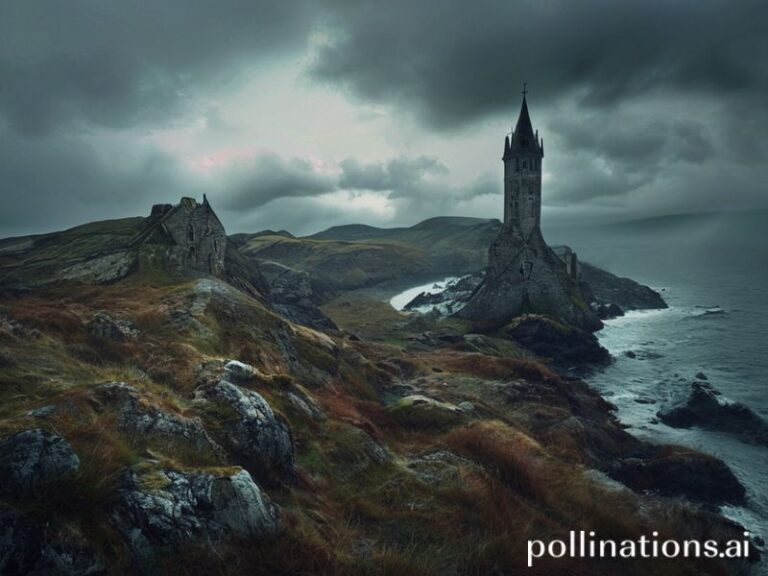From Iowa to Tbilisi: How Eric McAlister Became the Global Face of Privileged Panic
The Ballad of Eric McAlister: One Man’s Midlife Crisis as a Mirror to a Planet on Fire
By our jaded Paris correspondent, nursing a third espresso and counting the days until the next “once-in-a-generation” crisis
Eric McAlister, 47, former logistics manager from Des Moines, has become the latest unwitting protagonist in the world’s longest-running tragicomedy: late-stage capitalism. Last week Eric quit his job, sold his house, and bought a one-way ticket to Tbilisi, Georgia—not the peach state, but the one wedged between Russia’s imperial nostalgia and Europe’s bureaucratic delirium. His stated mission: “to reboot my life and finally open that craft-beer hostel.” The international press corps, ever hungry for a human-interest story that doubles as a metaphor, promptly declared Eric the poster child for post-pandemic wanderlust, Western malaise, and the universal urge to flee one’s own metadata.
From Davos to Dakar, analysts are asking what it means when a balding Midwesterner with a 720 credit score decides the American Dream now ships flat-pack from Scandinavia and requires Allen keys of the soul. In Singapore, venture capitalists are betting on “McAlistering” as the next lifestyle trend, already seed-funding apps that gamify existential dread. Meanwhile, the IMF has discreetly added “midlife geographic arbitrage” to its watch list of systemic risks, right after climate change and just before TikTok finance gurus.
Eric himself seems bemused by the fuss. Interviewed over lukewarm lagers in a Tbilisi courtyard, he admitted he’d never heard of Georgia until a Reddit thread claimed you could live like a minor oligarch on $1,200 a month. “I thought, hell, my mortgage back home was $2,800 and all I got was a lawn to mow and school-board meetings about banned books,” he said, gesticulating like a man who’s traded HOA emails for the minor-key melancholy of ex-Soviet architecture. Behind him, a stray cat—international symbol of indifferent fate—yawned on a Stalin-era radiator.
The broader significance, according to Dr. Lila Orlova of the Vienna Institute for Existential Economics, is that Eric represents a new class of “privileged refugees.” Not fleeing war or famine, but fleeing quarterly performance reviews and the humiliation of group Zoom calls. “It’s globalization’s latest irony,” she noted, stubbing out a cigarette with surgical precision. “We export middle managers the way we used to export democracy—messily, with unforeseen blowback.” Indeed, locals in Tbilisi have already formed Facebook groups lamenting the influx of laptop-toting Americans driving up rents and using “synergy” as a verb.
The geopolitical ripple effects are equally absurd. Moscow, ever alert to slights real or imagined, has reportedly dispatched a GRU officer disguised as an artisanal brewer to keep tabs on Eric’s hostel. Beijing, not to be outdone, has floated a competing hostel concept with facial-recognition check-in and a social-credit happy hour. Brussels is drafting regulations on maximum beard length for non-EU hosteliers. And somewhere in a Langley basement, a junior analyst is preparing a briefing titled “ERIC: Extremist Relocation to International Caucasus—Threat Assessment.”
Closer to home, Eric’s ex-wife in Iowa has monetized the saga with a Substack called “Left Behind in Des Moines,” which now earns more than Eric ever did in logistics. Their teenage daughter has started an OnlyFans for feet pics captioned with Nietzsche quotes, proving that nihilism, like everything else, finds its supply chain.
Of course, the universe loves a punchline. On the very day Eric poured his first pint of “Mid-Life Crisis Pale Ale,” the Georgian lari dipped 12 percent, and Russian tanks staged yet another “exercise” 40 kilometers north. Eric’s new business partner, a melancholy poet named Beso, shrugged: “In Tbilisi, crisis is our terroir. You will fit right in.”
Conclusion: Eric McAlister’s micro-drama is the macro farce in miniature. A planet overstimulated and underwhelmed sends its most disposable citizens to the edges of old empires, searching for meaning in the foam of artisanal beer. Whether he succeeds or ends up teaching English to oligarchs’ kids, Eric has already achieved something remarkable: he’s made the entire world feel slightly better about its own bad decisions. Somewhere tonight, another balding accountant in Brisbane or Bordeaux is Googling visa requirements, convinced geography can fix ontology. Spoiler: it can’t. But the Wi-Fi is cheaper, and the cats, at least, remain impressively indifferent.







